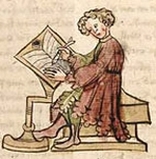Contemporary Sources
The story of Macbeth stands only a step or two from myth. No written Scottish sources have survived the centuries.
In England, the Anglo-Saxon Chronicles record a few comments (available on line at http://omacl.org/Anglo/part4.html).
Similarly in Ireland there are the Annals of Ulster and the Annals of Tigernach (available on line at http://www.ucc.ie/celt/.)
The Irish monk, Marianus Scotus also makes a brief mention of Macbeth. The accounts of contemporaries are as follows.
The Anglo Saxon Chronicle for 1031 reports that, ‘Malcolm, king of the Scots, submitted to him (King Canute), and became his man, with two other kings, Mac Bethad (Macbeth) and Iehmarc.’ From which we might infer that Macbeth was a king amongst others in Scotland at that time.
Marianus Scotus wrote that, "Duncan, the king of Scotland, was killed in the autumn by his earl, Macbeth, Findlaech's son" According to the Annals of Ulster, this appears to have been in 1040. It was reported that, "Donnchad (Duncan) son of Crinan, king of Alba, was killed by his own people.”
The death of Duncan’s father (Crinan) was attributed to Macbeth and is reported in the Annals of Tigernach for 1045 (entry 10) as follows, “A battle between the men of Scotland on one road, wherein Crínan, abbot of Dunkeld was killed and a multitude along with him, to wit, nine score laymen.” Note that Duncan was outlived by his father who had renounced the kingship and followed a religious career instead. He appears to have launched a revenge attack on Macbeth with inadequate forces.
In 1054 the Anglo-Saxon Chronicle reports that, “This year went Earl Siward with a large army against Scotland, consisting both of marines and landforces; and engaging with the Scots, he put to flight the King Macbeth; slew all the best in the land; and led thence much spoil, such as no man before obtained. Many fell also on his side, both Danish and English; even his own son, Osborn, and his sister's son, Sihward: and many of his house-carls, and also of the king's, were there slain that day, which was that of the Seven Sleepers.”
The Annals of Ulster for 1054 report the battle but without a decisive outcome, “A battle between the men of Scotland and the English in which fell 3000 of the Scots and 1500 of the English, including Doilfinn son of Finntor.”
The death of Macbeth is not reported, either in the Anglo-Saxon Chronicles or the Annals of Ulster.
The Anglo Saxon Chronicle for 1031 reports that, ‘Malcolm, king of the Scots, submitted to him (King Canute), and became his man, with two other kings, Mac Bethad (Macbeth) and Iehmarc.’ From which we might infer that Macbeth was a king amongst others in Scotland at that time.
Marianus Scotus wrote that, "Duncan, the king of Scotland, was killed in the autumn by his earl, Macbeth, Findlaech's son" According to the Annals of Ulster, this appears to have been in 1040. It was reported that, "Donnchad (Duncan) son of Crinan, king of Alba, was killed by his own people.”
The death of Duncan’s father (Crinan) was attributed to Macbeth and is reported in the Annals of Tigernach for 1045 (entry 10) as follows, “A battle between the men of Scotland on one road, wherein Crínan, abbot of Dunkeld was killed and a multitude along with him, to wit, nine score laymen.” Note that Duncan was outlived by his father who had renounced the kingship and followed a religious career instead. He appears to have launched a revenge attack on Macbeth with inadequate forces.
In 1054 the Anglo-Saxon Chronicle reports that, “This year went Earl Siward with a large army against Scotland, consisting both of marines and landforces; and engaging with the Scots, he put to flight the King Macbeth; slew all the best in the land; and led thence much spoil, such as no man before obtained. Many fell also on his side, both Danish and English; even his own son, Osborn, and his sister's son, Sihward: and many of his house-carls, and also of the king's, were there slain that day, which was that of the Seven Sleepers.”
The Annals of Ulster for 1054 report the battle but without a decisive outcome, “A battle between the men of Scotland and the English in which fell 3000 of the Scots and 1500 of the English, including Doilfinn son of Finntor.”
The death of Macbeth is not reported, either in the Anglo-Saxon Chronicles or the Annals of Ulster.
